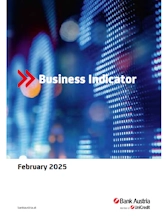Burden from US tariff policy makes GDP decline likely in Austria in 2025
“The UniCredit Bank Austria Business Indicator fell to minus 2.3 points at the end of the first quarter. However, the decline was minimal at just one tenth of a percentage point”, says UniCredit Bank Austria Chief Economist Stefan Bruckbauer, adding: “In the first quarter of 2025, the UniCredit Bank Austria Business Indicator rose to an average of minus 2.4 points, the best value in four quarters. In combination with the improved real economic data from industry and construction as well as the slight growth in retail and the automotive trade, the indicator suggests that the Austrian economy has left the recession behind. For the first time after eight negative quarters, economic output in Austria should have risen slightly again at the start of 2025.”
- UniCredit Bank Austria Business Indicator fell by 0.1 points to minus 2.3 points in March
- The decline in sentiment in all economic sectors could not be offset by higher consumer confidence
- Losses of 0.25 percentage points due to US tariff policy: GDP forecast from +0.1 to -0.2 percent
- Noticeable economic growth of 1.1 percent is not expected until 2026
- The problems on the labor market are increasing: Unemployment rate expected to rise to 7.5 percent in 2025, with no improvement in sight for 2026
- Inflation expectations unchanged: Decline in inflation to an average of 2.5 percent in 2025 and 1.9 percent in 2026
- The burdens of US tariff policy are likely to prompt the ECB to lower the deposit rate below the neutral level to 1.75 percent by the end of 2025

UniCredit Bank Austria Business Indicator (PDF)
UniCredit Bank Austria Business Indicator – Computation method (PDF)
as of April, 2025
About UniCredit Bank Austria Business Indicator
The UniCredit Bank Austria Business Indicator provides an overview of the current economic situation in Austria.
These publications do not constitute investment advice, investment recommendations, marketing communications, or financial analysis. In particular, they are not an offer or solicitation to buy or sell securities and do not constitute a solicitation to make such an offer. They are intended solely as initial information and are no substitute for advice based on the individual circumstances and knowledge of the investor.
It is an analysis based on publicly available economic data. Despite careful research and the use of reliable sources, no responsibility can be taken for completeness, correctness, timeliness and accuracy.
Any investment in securities involves risks. The value of the investment and the income from it may fluctuate suddenly and substantially and therefore cannot be guaranteed. There is a possibility that the investor will not get back the full amount invested, particularly if the investment is held for only a short time. In some circumstances, a total loss is also possible.
Possible (return) payments from the product may not protect investors against inflation risk. There can be no assurance, therefore, that the purchasing power of the capital invested will not be affected by a general increase in the prices of consumer goods. Figures and information on performance refer to the past and past performance is not a reliable indicator of future results.
Only in the context of an investment advisory service can UniCredit Bank Austria AG take into account the personal circumstances of the customer (investment objectives, experience and knowledge, risk appetite, financial circumstances and financial loss tolerance) and carry out a product-specific suitability test.
We would like to point out that the tax treatment depends on the personal or company circumstances of the investor and that the information on tax advantages is provided on the basis of the current legal situation, which may be subject to future changes and for which no information can be given as to whether they will be continued.






